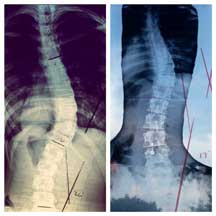 KINGSTON, R.I. – Oct. 16, 2013 – They called her “brace freak.” They’d swipe her brace in the locker room and refuse to give it back. At lunch, no one would sit with her; they thought her scoliosis was contagious.
KINGSTON, R.I. – Oct. 16, 2013 – They called her “brace freak.” They’d swipe her brace in the locker room and refuse to give it back. At lunch, no one would sit with her; they thought her scoliosis was contagious.
Rachel Mulvaney did what any middle school kid would do faced with all that teasing: she cried. The loneliness was awful. The brace felt like a turtle shell around her torso. She wondered, “Why me?”
Still, she plowed through those painful years, turning a devastating experience into a force for change with the publication this summer of a book she helped write, Straight Talk with the Curvy Girls: Scoliosis – Brace Yourself for What You Need to Know.
“We grow up in a Barbie doll society where girls always have to look perfect,” says Mulvaney, now a 19-year-old freshman at the University of Rhode Island. “Scoliosis impacts a girl in a negative way. I want girls with scoliosis to stop hating their bodies, to eliminate that Barbie doll society we constantly live in.”
In Straight Talk, Mulvaney and eight other young women describe in personal essays what it’s like to have an illness that causes their spine to grow curved instead of straight, requiring them to wear a plastic brace for 16 to 23 hours a day for several years during middle school and high school.
“The girl who was once outgoing and happy was quickly disappearing,” Mulvaney writes in her essay. “The colors began fading away as I felt myself falling into this dark hole. Sleep became my great escape. I felt that if I were sleeping, it would be fewer hours awake in the brace.”
Mulvaney says the response to the book, self-published by her mother and another parent whose daughter also has scoliosis, has been positive. Thousands of copies have been sold worldwide, not only to patients, but also to orthopedists, physical therapists, and orthotists, the people who make the braces.
In addition to the memoirs, the book also includes mothers’ accounts of the frustration and sadness they feel seeing their daughters in emotional and physical pain, as well as details about the latest medical treatments, physical therapy and surgery options, and even dressing tips for girls who wear braces.
“We hope this book helps parents and kids on their journey,” says Mulvaney, who is majoring in health studies so she can pursue a career involving scoliosis. “I wanted to give back the unconditional support I received during my time of need, and participating in this book is one way of doing that.”
Her other way involves a nonprofit support group, Curvy Girls, which started off as a chapter with only Mulvaney and three other girls and has expanded to 55 chapters in 35 states and four countries, including Brazil, Canada, and Australia. Mulvaney is working with a Rhode Island girl to start a group in the state.
 Mulvaney was 9 when she was first diagnosed with scoliosis. She and her third-grade classmates on Long Island were in the nurse’s office for a routine screening. “When she raised my shirt, she gasped,” Mulvaney says. “Everyone came, had their evaluation, and left with a lollipop. I had to be retested, so I sat behind my class and waited.”
Mulvaney was 9 when she was first diagnosed with scoliosis. She and her third-grade classmates on Long Island were in the nurse’s office for a routine screening. “When she raised my shirt, she gasped,” Mulvaney says. “Everyone came, had their evaluation, and left with a lollipop. I had to be retested, so I sat behind my class and waited.”
Her parents took her to an orthopedic surgeon, who suggested keeping an eye on her. Eventually, her back started to ache. One day, her mother lifted her shirt. Another gasp. At 11, she was fitted for a brace – “The worst experience of my life.” She wept, as an orthotist tightened the straps and told her to “suck in your stomach” and “hold your breath.”
Her years of “bracing” had begun. She wore the brace, made of hard plastic, 16 hours a day – at school, during extracurricular activities, at friends’ houses. “I could barely breathe,” she says. “Even eating was difficult.” With no flexibility, a simple thing like picking up a dropped pen was a project.
The teasing was relentless. “I see your brace – weirdo,” was just one of many unkind remarks hurled at her in middle school. To make things worse, her brace didn’t fit properly; it was so tight it left bruises on her body. The screws holding the brace together poked holes in her shirts. She sank into a depression. “I just felt so small,” she says.
Her life changed in 2006 when she met another Long Island girl with scoliosis, Leah Stoltz, who started Curvy Girls. Mulvaney was reborn at the first meeting. “It felt so incredible to be in a room with other girls who had the same feelings I had,” she says. “I realized I wasn’t alone.”
They talked about how to deal with bullies (ignore them), how to dress (wear layers and leggings), and where to find the latest treatment methods (ask a lot of questions). Mulvaney attended a meeting of Curvy Girls every month for the next three years.
“It changed my life,” she says. “One of the things that made me so proud to be part of this group was that there were no clicks, no popular girls, no mean girls, just girls with scoliosis whose goal was to help each other.”
At 14, her doctors decided that her spine was healthy enough to stop treatment. Her brace came off. She still does back exercises every day and will for the rest of her life, but the turtle shell is gone. Her goal now is to help other young girls cope with the disease.
Mulvaney says the cause of most scoliosis is unknown. Genetics play a role, but, even then, the disease’s origin is still a mystery. Boys and girls both get the disease, but the illness tends to progress into puberty with girls.
Thanks in part to a shout-out on Nickelodeon’s annual “TeenNick Helping and Leading Others Awards,” Curvy Girls is thriving and has its own website, curvygirlsscoliosis.com. The group hosted a scoliosis convention last year on Long Island and is planning a second gathering next summer.
“It’s been incredible to take something that started off so negative and turn it into something so positive,” says Mulvaney. “It’s funny; people ask me if I would ever take anything back. I’d never take anything back. Everything that happened to me makes me who I am today.”
Copies of Straight Talk are available for $21.95 through Straight Talk. For information about Curvy Girls, contact Mulvaney at ramulvaney94@aol.com.
“I want girls to know that they’re never alone,” says Mulvaney. “No matter how difficult this journey seems, they can overcome it.”
What happened to Mulvaney’s old brace? She still has it. She takes it with her when she talks to middle school students about bullying. The brace is a “prop,” she says, but it’s really so much more.
Pictured above:
Rachel Mulvaney, 19, a freshman at the University of Rhode Island who helped write a book about coping with scoliosis, a curvature of the spine. Mulvaney, of Mount Sinai, N.Y., is majoring in health studies at URI; her minor is leadership studies. Photo by Mike Salerno Photography.
Scans of Rachel Mulvaney’s spine, before (left) and after (right) treatment. Photo courtesy of Rachel Mulvaney.

